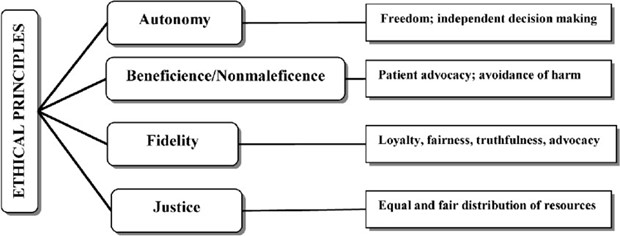A nurse on an inpatient mental health unit is caring for a group of clients. Which of the following actions by the nurse demonstrates the ethical concept of autonomy?
Spending extra time to calm an agitated client
Ensuring that a client understands expectations for group participation
Describing the adverse effects of a client's medications
Importing a client's wishes to refuse prescribed treatments
The Correct Answer is D
Autonomy is the ethical principle that upholds an individual's right to make decisions about their own care and treatment. Respecting autonomy means acknowledging and honoring a person's right to make choices based on their own values, beliefs, and preferences. By importing a client's wishes to refuse prescribed treatments, the nurse is recognizing and respecting the client's autonomy. This shows that the nurse values the client's right to make decisions about their own healthcare and supports their choice, even if it may differ from what the nurse may recommend.
Incorrect:
A. Spending extra time to calm an agitated client demonstrates the ethical principle of beneficence, which is the duty to promote the well-being and welfare of the client.
B. Ensuring that a client understands expectations for group participation relates to the ethical principle of fidelity, which involves maintaining trust and keeping promises to the client.
C. Describing the adverse effects of a client's medications is important for informed consent and promoting understanding, but it does not directly involve the client's autonomy unless it is accompanied by a discussion of the client's choices and preferences regarding medication.

Nursing Test Bank
Naxlex Comprehensive Predictor Exams
Related Questions
Correct Answer is D
Explanation
Cognitive reframing involves changing negative or unhelpful thought patterns into more positive and constructive ones. By learning to change negative thoughts into positive statements, the client is actively engaging in cognitive reframing. This process helps the client challenge and reframe negative thoughts, replacing them with more positive and adaptive thoughts. By doing so, the client can reduce stress, improve their mood, and approach challenging situations with a more positive mindset. This technique is an effective way to cope with stress and promote emotional well-being.
Incorrect:
A. The client trains his mind to relax by using deep inner resources. This choice refers to relaxation techniques, which can be helpful for stress reduction but are not specifically related to cognitive reframing. Cognitive reframing focuses on changing thought patterns rather than relaxation techniques.
B. The client learns the source of his stress by writing down daily events. While identifying the source of stress can be an important step in stress management, it is not specific to cognitive reframing. Cognitive reframing involves challenging and changing negative thoughts, rather than solely focusing on identifying stressors.
C. The client imagines being in a quiet, relaxing environment. This choice refers to visualization or guided imagery techniques, which can also be helpful for relaxation but are not specifically related to cognitive reframing. Cognitive reframing involves changing thoughts, beliefs, and interpretations, rather than focusing on imagining specific environments.
Correct Answer is A
Explanation
The response "I will assist you in getting out of bed and getting dressed" demonstrates a supportive and therapeutic approach. It acknowledges the client's current state and offers assistance to engage in self-care activities. By providing support and actively participating in the client's care, the nurse can promote motivation, engagement, and a sense of empowerment.
The response "You can remain in bed until you feel well enough to join the milieu" may enable the client's depressive behaviors and reinforce the avoidance of activities. It does not encourage participation or provide support for the client to engage in therapeutic activities.
The response "The unit rules state that clients may not remain in bed" focuses on enforcing rules rather than addressing the client's underlying emotional state and needs. It may increase resistance and hinder the therapeutic relationship.
The response "If you don't participate in your care, you will not get better" may be perceived as blaming or judgmental. It may increase the client's guilt or sense of failure and does not provide practical support or encouragement.
Whether you are a student looking to ace your exams or a practicing nurse seeking to enhance your expertise , our nursing education contents will empower you with the confidence and competence to make a difference in the lives of patients and become a respected leader in the healthcare field.
Visit Naxlex, invest in your future and unlock endless possibilities with our unparalleled nursing education contents today
Report Wrong Answer on the Current Question
Do you disagree with the answer? If yes, what is your expected answer? Explain.
Kindly be descriptive with the issue you are facing.
